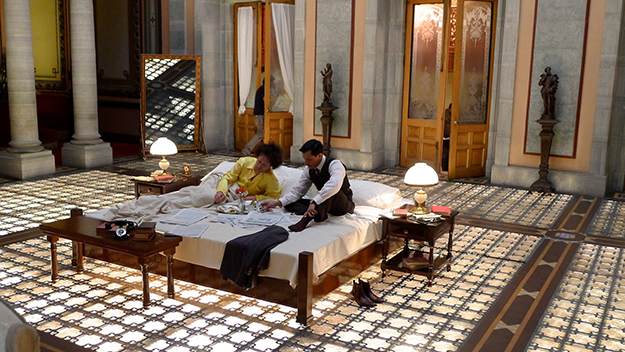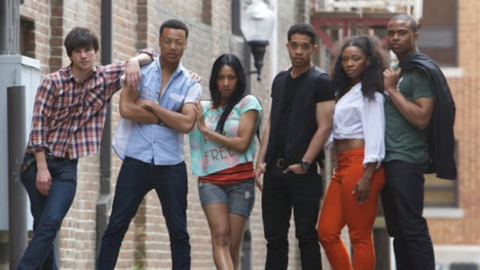Festivals: NewFest

Henry Gamble’s Birthday Party
After the Obergefell v. Hodges Supreme Court decision in June, the American LGBT community found itself celebrating a decades-long battle to ratify its right to marriage. Images of happy couples across the nation were splashed across national newspapers and online media alike. The “Love Is Love” campaign had triumphed after all. But even as engaged couples began to file the necessary paperwork and newlyweds were being feted by friends and family, those at the fringes of the gay community began to loudly ask its self-appointed leaders to take stances on issues that had long been shelved in the pursuit of marriage equality: trans rights, workplace discrimination, immigration reform. Most of these require careful examinations of difference, deflating the humanist rhetoric that had become the greatest asset in the community’s quest for change. After all that, how could a political campaign now be waged in the name of fluid and ever-shifting identities that defy and push back against the kind of narratives of sex, gender, love, and nation that had proven so effective?
Against the backdrop of this moment, it’s no surprise that so many entries in NewFest, New York City’s premier LGBT film festival, center on young protagonists whose stories stage complex interventions into questions of queer identity. They leave behind the simple notion of a politically effective label (“gay,” “lesbian”) and probe instead the very ambiguity inherent in queer sexuality, without resorting to the most well-worn narrative template of gay cinema (the coming-out story) or to ahistorical celebrations of the gay experience. In the festival’s stand-out films, sexual exploration and personal introspection are not oriented toward the closet door. Instead, they thrust characters and narratives into the at times difficult, at times exhilarating reality of being a member of the LGBT community.

Eisenstein in Guanajuato
Peter Greenaway’s Eisenstein in Guanajuato, the festival’s opening selection, is a brazenly flamboyant look at the Soviet master’s sojourn down south (and east) in the Thirties to attempt ¡Que viva México!, a film about that country’s storied history. Greenaway, though, is as uninterested in that film project as his Eisenstein (Elmer Bäck), who prefers to lounge in bed with his Mexican companion, Palomino Cañedo (Luis Alberti). While the film — like Sergei — would readily spend its duration in Guanajuato merely indulging in lustful excesses, Greenaway does offer some history behind the troubled Mexico production, which included an embattled relationship with producers Upton and Mary Sinclair, who commandeered all of Eisenstein footage in an attempt to get him to finish his project, and eventually, an immigration lawsuit (courtesy of Eisenstein’s now infamous and pornographic drawings) which forced the director out of the country and away from his Palomino “stud.” Part homage and part queer revisionist history, his film puts Eisenstein’s alleged homosexuality front and center, surely motivating many of Greenaway’s exuberant stylistic flourishes, which feel like sensuous refractions of the groundbreaking techniques in Battleship Potemkin and Strike. Matched by a script that gives Bäck endless monologues about Eisenstein’s body, his politics, and his visions of Mexico, Eisenstein in Guanajuato argues that the vibrancy of the Spanish-speaking country awakened the director’s libidinal side, his debauchery culminating in an explicit sexual encounter between the two men involving olive oil which brings Eisenstein (quite literally) to his hands and knees. It’s a fitting opening title for the festival, loudly and proudly wearing its queerness on its sleeves.
“How big is yours?” The opening lines of Stephen Cone’s Henry Gamble’s Birthday Party are designed to subvert the seemingly straightforward scenario suggested by its title. They’re delivered to the camera, which is positioned as if we were sharing a bed with the young, shirtless, blond, freckled Henry (Cole Dolman), and makes the moment even more jarring. Henry is addressing Gabe, his best (straight) friend from school, and in Dolman’s eyes, you already see this pastor’s son and active member of his church youth group struggling with his sexual longing. Cone’s script, which could easily have made Henry’s homosexuality the Chekhov gun of the piece, is interested instead in staging a number of conversations about sexuality within the Christian faith—a timely issue given the media circus surrounding Kim Davis, the Rowan County clerk who has become a symbol for ill-conceived notions of religious liberty rights. Henry’s sun-dappled and indie-music scored pool party is host to a series of interlocking plots including an extramarital affair, a nervous breakdown, and a high-school tryst, that all address, with varying degrees of success, the issue of sexual repression within a faith-driven community. Much of the didacticism of the film is attenuated by Cone’s strong ensemble who work hard at fleshing out these stories and imbuing their characters with a humanity that makes them feel more than mere ideological mouthpieces. 
Naz and Maalik
Two genuinely simple yet no less engrossing stories about young love were Alanté Kavaïté’s The Summer of Sangailė and Jay Dockendorf’s Naz and Maalik. Kavaïté, who won the directing award in the dramatic world cinema category at Sundance in January, shoots the summer romance between Sangailė and Auste, two teenagers in a small town with remarkable sensuality. The Lithuanian seaside where the film is set frames Sangailė’s blossoming from sullen teenager to luscious lover and later, after a well-placed time-jump, a fearless stunt pilot, imbuing her lesbian romance with liberating and therapeutic consequences (she suffers from vertigo). The plot may well be well-trodden but Kavaïté succeeds in representing the throes of young sexual desire as essential fuel for artistic inspiration—Auste is a fashion designer and photographer who pushes Sangailė to face her fears both physical and emotional. Dockendorf’s unassuming two-hander is a portrait of what it means to be gay, black, and Muslim in contemporary New York City. As the young boys of the title walk the streets trying to sell lottery tickets for extra income, discuss the merits of altruism, and try to make sense of their budding physical attraction, the film relentlessly dispels any pretense to privacy these young boys may feel they have. Every moment of shared public intimacy is irrevocably (and unfortunately) tied up with larger political and cultural implications. A walk down an alley for a furtive embrace fuels the baseless suspicions of an NYPD cop. A stolen kiss on the subway raises a devout sister’s alarm. Grounded in the naturalism of his two leads (Kerwin Johnson Jr. and Curtiss Cook Jr.), Naz and Maalik is a tender love story set against a post-9/11 culture of surveillance, reminding us that the high-profile gains in the courts that make great headlines still do not accurately represent the entire gamut of the queer experience day to day.
And finally, the festival’s closing film, Alexandra-Therese Keining’s Girls Lost (Pojkarna in the original Swedish, which translates as “The Boys”), presents a sophisticated take on gender variance in the wrappings of a teen supernatural drama. At the heart of the film is a fairy tale: once upon a time there were three girls living near the edge of the woods who found a magical black flower that could transform them into boys for the night. Set in a contemporary Swedish village where these outcast girls suffer taunts from immature boys who sense their own discomfort at the girls’ closeness and potentially lesbian identities, Girls Lost uses its supernatural premise to literalize the fluidity of gender and sexuality. Keining’s sleek visuals and a radio-ready soundtrack make this Grimm-like premise play like a gut-wrenching thriller when one of the girls begins losing herself in her male alter-ego. Posing as a boy from out of town, Kim (played by Tuva Jagell as a girl, and Emrik Öhlander as a boy) begins a flirtatious friendship with Tony, only to be called out by her (girl)friend Momo, who boldly asks her: “Are you in love with him or do you just want to be him?” Kim cannot bring herself to answer for fear of what her response might say about her. Keining offers no tidy resolution for her protagonist. Instead, the ambivalent ending, which turns Kim into an outcast hoping to escape from her own body, makes the very first words we see on screen at the start of the film read not only like a promise but a warning: “If you’re blind to what is different, this story is not for you.” Which may very well function as a description of NewFest’s 2015 offerings.
NewFest runs October 22 to 27 at the Chelsea Bow Tie Cinemas in New York.






